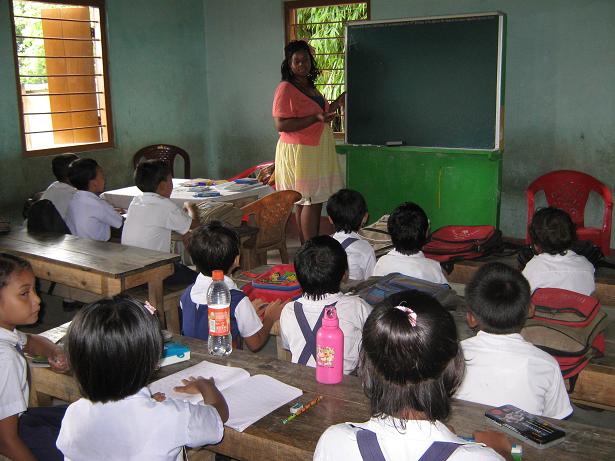Transforming Education into Global Empowerment

Derrika Hunt, MSW graduate
Current Ph.D. student at University of California, Berkeley
Guwahati, India; Summer 2012
I initially traveled to India in the summer of 2012 to complete a Directed Independent Study under the supervision of Dr. Neil Abell. Since, 2012 I have continued to travel to India each year to further my research. I was so inspired by my research findings that I wanted engage in developing a sustainable relationship with the Guwahati community so I could continue my research. I made strong connections with many of the students, teachers and community members which has enabled me to gain an in-depth understanding of the role education plays in poverty reduction.
The idea to conduct research in India came while I was taking an International Social Work course. The course work in this class truly encouraged me to think critically about international issues and how to approach them with a social work lens. I wanted to gain more insight and apply some of the theories I learned in an international context. Furthermore, I wanted to conduct research while also actively serving the community through volunteer services. I was particularly interested in understanding how education can be used as a tool of poverty reduction in various countries. After researching a variety opportunities, I settled on conducting my research at Parijat Academy in India.

Parijat Academy is located in the city of Guwahati and it’s unique because it provides all students with access to free education. Parijat Academy is an anomaly because most schools in the area are unable to provide free education due to receiving no government support. But the Principal of Parijat Academy, Uttam Teron, wanted to create a school because he believed that education is a human right that children should not be deprived of. Uttam expressed to me that ensuring the children of his community had access to education would change their future. He believed strongly that education would help eliminate the abject poverty that plagued the community. Most people in the community live on less than $2 a day. Thus, he started the school with only four students, but he worked relentlessly to collect donations and resources; his efforts have enabled the school to expand to serving over 500 children. It is one of the largest non-government run schools in Northeast India. After reading about Uttam’s bold aspirations, I wanted to travel there to engage in research and understand how this school is impacting the community.
During my time in India, I focused my research on understanding the link between poverty reduction and education. I wanted to gauge if education really is a viable tool to combat poverty. Prior to arriving in India, I spent a great deal of time researching poverty, policy and education in the context of modern India. I wanted to understand how access to education affected individuals in poverty. I further wanted to assess how education personally impacted individuals in poverty. My research findings were astonishing to say the least. I found that access to education often provided individuals with more opportunity and a plethora of resources previously unavailable to them. Additionally, many of the students who I conducted research on were from a remote village in which they did not have a school, yet they were given the opportunity to attend school for the first time at Parijat Academy. Prior to attending school, many of these students engaged in agricultural work to support their families. Learning about the personal history of the students caused me to reassess my definition of education. I began to reevaluate what it means to be educated. I started asking questions about the standardization of education. Does education have to take place in the perimeters of a classroom? Can education occur in an agricultural setting? These are questions I’m still wrestling with. I found that many of the students from the remote village were illiterate before attending Parijat Academy but they had so many other valuable skills they had learned from their life experiences. To say the least, my experience in India truly exceeded my expectations. It also sparked my curiosity to assess the link between education and poverty in global, comparative study. Thus, I have decided to pursue a PhD in education. My experience in India really shaped my work and helped me define what I want to do long-term. I’m currently enrolled at University at California, Berkeley and I’m analytically evaluating the links between education and poverty reduction. Like Nelson Mandela, I too believe that, “Education is the most powerful weapon which you can use to change the world.”
